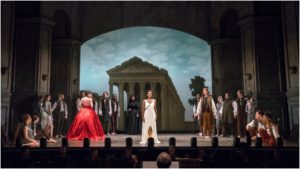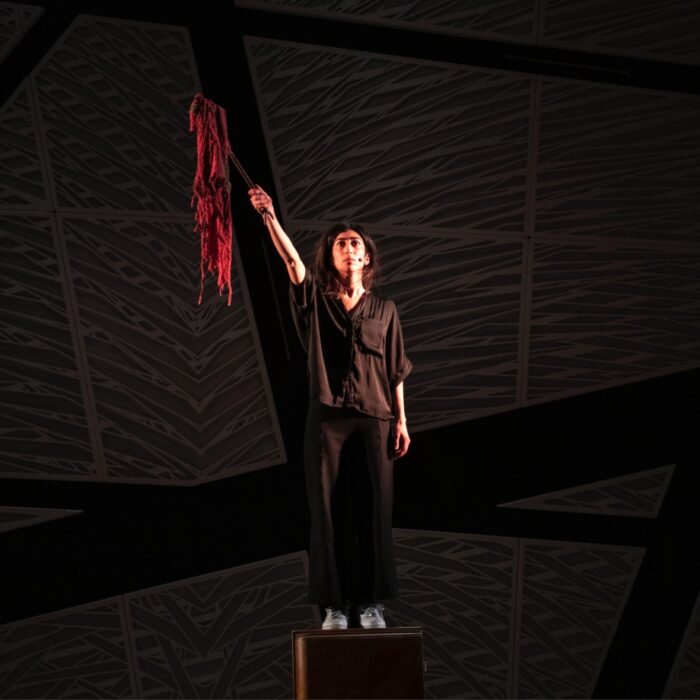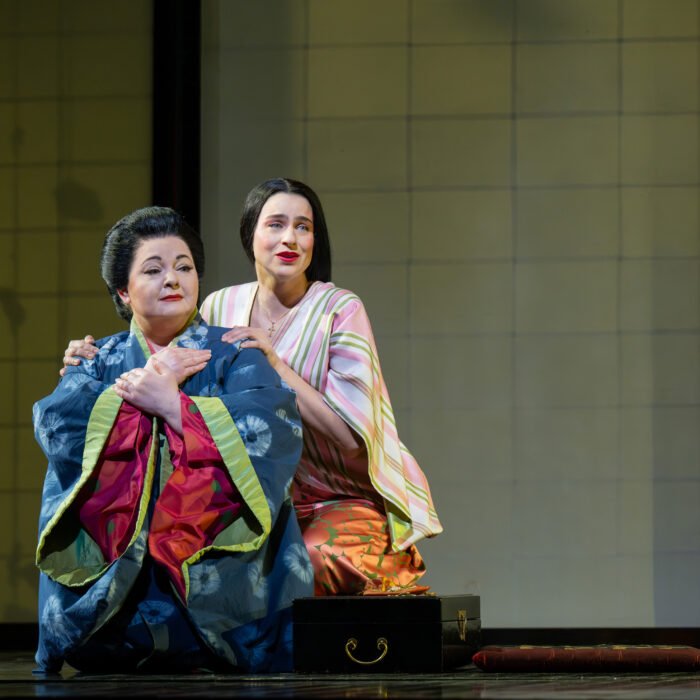
Juilliard School 2018 Review – Hippolyte et Aricie: Production Recreates What Rameau Would Have Hoped For
By Jennifer PyronPremiering in 1773, Jean-Phillipe Rameau’s first opera, “Hippolyte et Aricie,” was considered to be a ground-breaking and controversial work that would further inspire a continuation of masterpieces that Rameau would create in support of “modern” music. Modeled after Racine’s tragedy “Phèdre,” Rameau created a tragédie lyrique, that stirred perspectives surrounding a genre of French opera that began with Jean-Baptiste Lully and Philippe Quinault. No one had dared to come close to disturbing the celebrated reign of Lully’s work. However, when Rameau did challenge the tragédie lyrique style, it ignited the debate between the traditional “Lullistes” and “Ramistes.”
Recreating a Masterpiece
Juilliard has made remarkable strides over the years with the performances of uniquely innovative works, with the support of a list of prestigious individuals. And for Rameau’s “Hippolyte et Aricie,” no detail was ignored in order to recreate this masterpiece. What made this opera most special was the fact that Stephen Stubbs held true to Rameau’s original music and made what was seemingly unfeasible to singers in the past, remarkably vital in interpretation to the Juilliard cast. In Act Two, there was a notable harmonic variation that, as Maestro Stubbs said, “lends the effect that – as though in an earthquake – the solid ground gives way beneath the listener’s feet.” It was in this specific moment of the opera that the audience was able to see and hear what Rameau intended for his work, as part of a large-scale innovative movement. The cast in this scene is in Hades, so to have a particular mind-blowing experience was perfectly fitting.
Flawless From The Get-Go
Alex Rosen, as Thésée, engaged the audience from the start with his flawless delivery of recitative. Rosen’s voice carried throughout the theater and gave profound base to his character. He also exemplified the necessary vocal technique and acting skills necessary to carry the weight of his role as King Thésée.
Kelsey Lauritano, as Diane, also established herself in this scene with a superior stance in her role and a beautifully rich vocal tone. She personified Diane throughout the entire opera with outstanding acting skills that fueled her passionate connection to the music and highlighted her unwavering vocal technique. Lauritano was a true inspiration to be witnessed in this role.
In the most terrifying portion of the opera, Act Two takes place in Hades where the audience meets Tisiphone, played by Joshua Blue, and William Guanbo Su, as Pluton. To say that the cast was physically engaged in this scene is an understatement. In fact, each member proved to be in top physique, as it would not have been possible without serious preparation. Joshua Blue gripped tight to the red rope that seemed to squeeze the life out of Thésée’s body, and violently tossed him about in the swarm of writhing hell-bound entities as he led him to Pluton. It was an extremely heavy scene that was then amplified by the sheer power of Su’s voice, as he addressed Thésée and told him, “You are so eager to run from here, but you leave one hell only to find another awaiting you at home.”
Making Herself Visible
In the palace during Act Three, we were introduced to Phèdre, played by Natalia Kutateladze, as she struggled with bringing to light her true feelings towards Hippolyte. Kutateladze wore an intricately embellished red gown that showcased the extraordinarily beautiful work of Costume Designer Sarah Cubbage. The audience could not take their eyes off of Phèdre in this act, as she exploded into anger and rage against Aricie for interfering with her plan to have her stepson’s favor. One also noted how strategically Kutateladze moved about the stage and even sat in her chair, in order to give optimal viewing of her character’s overall expressions and gown. Every image during this scene was a cerebral feast for the audience to partake in and revel in the perfectly calculated details that unfolded. And as Thésée arrived home to the mess that awaited him, he too added to the furiousness and confusion that Rameau so adequately played into with his music.
True Chemistry
It was in Act Four where Hippolyte and Aricie posed the question of “can she (Diane) condemn a truly virtuous love?” Onadeck Winan, as Aricie, pours her heart into this scene when Hippolyte, played by Kyle Stegall, pledges his commitment towards her, and the audience experienced a heart-wrenching chemistry between the two. Winan sang with honesty and conviction in this moment. She was flawless and her soul-connection to what she was singing created a euphoric bliss for listeners. Stegall held her and also blossomed into his character with a gentle tone that melted the hearts of all. Together, the two created a realistic emotional bond that was then staged to be broken when a tragic storm took the life of Hippolyte. In this moment, Phèdre kills herself and everyone is left reeling again in utter shock and horror.
Thésée is taken over in grief for Hippolyte and the ruin of his personal life. As Thésée, Rosen depicted a character that was defeated internally and the audience felt the sense of loss and emptiness that he embodied. Aricie is also met with a new turn of events when she awakens in Diana’s forest with grief but is encouraged by Diane to meet a reborn Hippolyte. It was then that Aricie sang in joy about her fate to marry Hippolyte and the audience enjoyed a duet, between Winan and flute soloist Jonathan Slade, that imitated bird calls. Diane then welcomed love into her forest and everyone joined in singing and dancing. Although Thésée is forbidden to ever see Hippolyte again, the opera ended with a message of hope for all who choose to see the beauty in the world around them.


